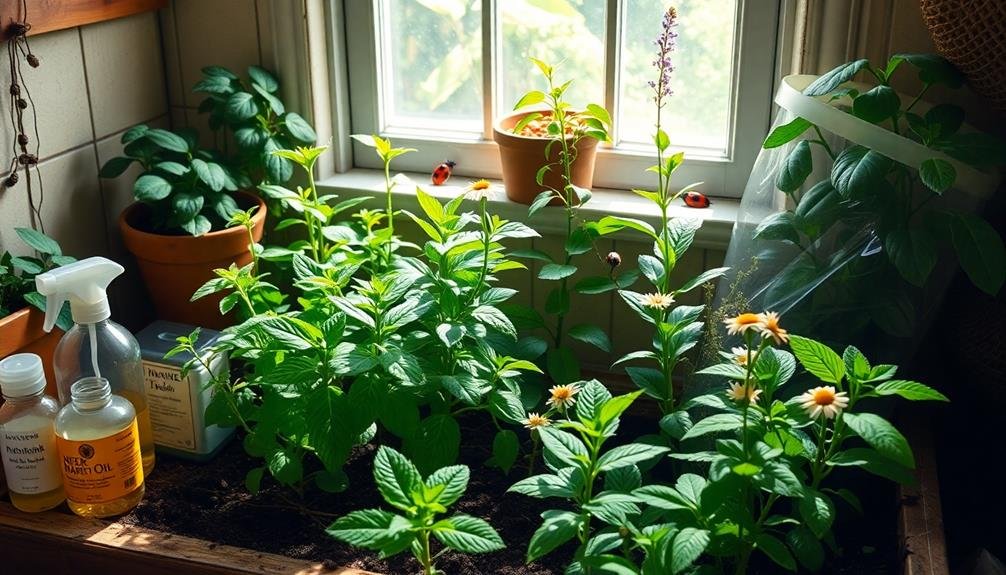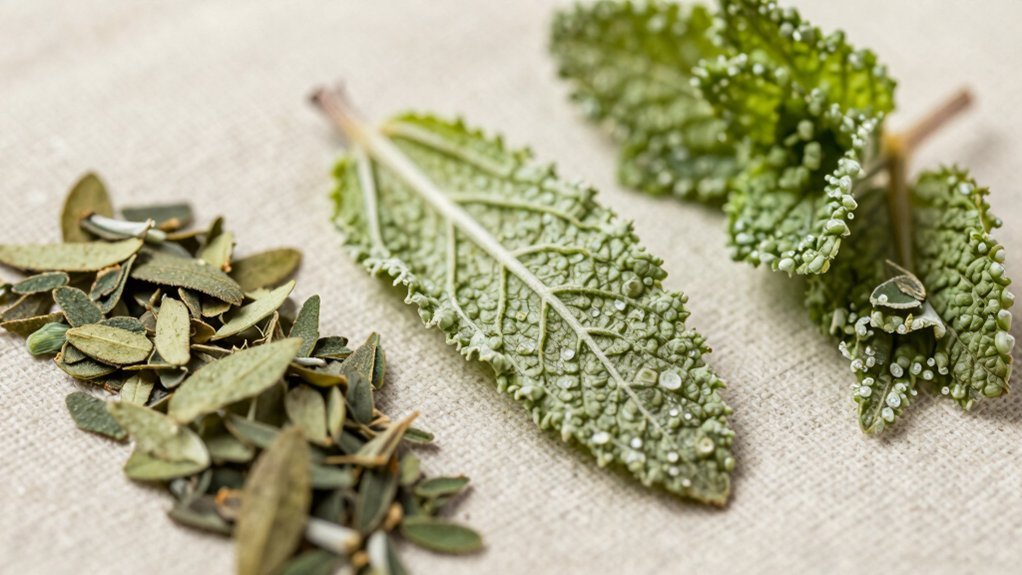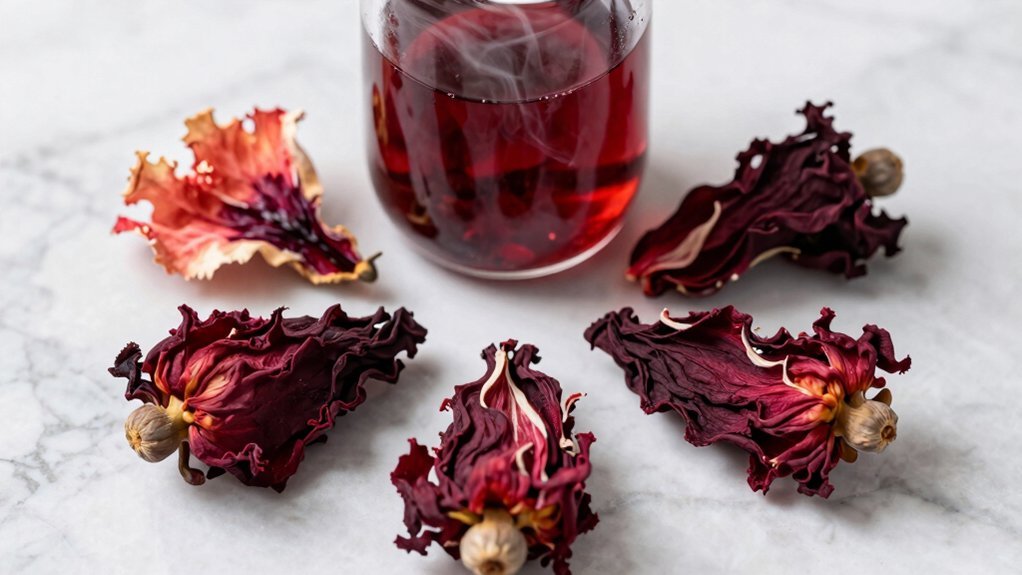You can effectively manage pests in your indoor tea herb garden using natural solutions that promote health and safety. Start by regularly inspecting your plants for signs of common pests like aphids and spider mites. Apply neem oil or a soap spray to disrupt their life cycles. Garlic and peppermint oil sprays can also act as effective repellents. To prevent infestations, guarantee good air circulation and avoid overwatering. Additionally, consider companion planting to naturally deter pests. With a proactive approach, you'll cultivate a thriving garden. There's plenty more to explore to guarantee your indoor herbs flourish beautifully.
Common Indoor Herb Pests

Indoor herb gardens can often attract a variety of pests, and you might frequently encounter some common culprits. One of the most notorious is aphids. These tiny bugs suck the sap from your plants, leading to stunted growth and curled leaves.
You might also spot spider mites, which create fine webs on your herbs, signaling their presence. They thrive in dry conditions and can quickly damage your plants if left unchecked.
Another pest to watch for is whiteflies. These small, white insects flutter around your plants and sap their vitality. If you notice a sticky residue on your leaves, it's a sign these pests are at work.
Additionally, fungus gnats can be a nuisance. They breed in damp soil and can damage young roots, making them particularly troublesome for new herbs.
Identifying Pest Infestations
To keep your indoor herb garden thriving, you need to recognize common pests and their signs early on.
Look out for tiny insects, webbing, or discolored leaves, as these can indicate an infestation.
Common Indoor Pests
Often, you mightn't notice the subtle signs of pest infestations until they become a bigger problem. Common indoor pests can wreak havoc on your tea herb garden if left unchecked. Familiarizing yourself with these pests can help you catch infestations early and protect your plants.
Here are some common indoor pests to watch out for:
- Aphids: Small, soft-bodied insects that suck sap from your plants, often clustering on new growth.
- Spider Mites: Tiny spider-like creatures that create fine webs on leaves and can cause yellowing and stippling.
- Whiteflies: Small white moth-like insects that feed on the underside of leaves, leading to wilting and yellowing.
- Fungus Gnats: Tiny flies that thrive in moist soil, their larvae can damage roots and stunt plant growth.
Being aware of these pests is your first line of defense. Regularly inspecting your plants will help you identify any unwelcome visitors before they multiply.
If you spot any of these pests, take action quickly to prevent more significant issues down the line. Your indoor tea herb garden deserves to thrive!
Signs of Infestation
Recognizing the signs of infestation is essential for maintaining a healthy indoor herb garden. Start by closely inspecting your plants for any visible pests. Look for tiny insects, such as aphids, spider mites, or whiteflies, often found on the undersides of leaves.
If you notice sticky residue or a web-like substance, these could be indicators of spider mite activity.
Next, check for discolored or wilting leaves. Yellowing leaves might suggest nutrient issues, but they can also signal pest problems. Additionally, if you see small holes in the leaves or stunted growth, it's time to investigate further.
Don't forget about the soil. If you spot tiny larvae or crawling bugs in the potting mix, you likely have a pest issue. You might also observe tiny black specks, which could be frass (insect droppings).
Lastly, keep an eye out for any unusual odors coming from your plants. A foul smell can indicate rotting or pest-related issues.
Natural Remedies for Pest Control

Many gardeners face the challenge of pests invading their indoor herb gardens, but there's good news: natural remedies can effectively keep these unwelcome visitors at bay.
By using household ingredients and eco-friendly solutions, you can protect your precious herbs without resorting to harsh chemicals.
Here are some effective natural remedies you can try:
- Neem oil: This natural pesticide disrupts the life cycle of pests, preventing them from reproducing.
- Soap spray: A simple mixture of water and mild soap can suffocate soft-bodied insects like aphids and spider mites.
- Garlic spray: Blending garlic cloves with water creates a potent deterrent, as many pests dislike the strong smell.
- Peppermint oil: Mixing a few drops of peppermint oil with water can repel ants and spiders, leaving your herbs safe.
Preventative Measures for Indoor Herbs
To maintain a thriving indoor herb garden, it's essential to adopt preventative measures that deter pests before they invade. Start by ensuring your herbs receive adequate light. Place them near a window or use grow lights to keep them healthy and less susceptible to infestation. Regularly check your plants for any signs of pests, like discolored leaves or webbing, and address issues immediately.
Next, keep your growing area clean. Remove any dead leaves or debris that can attract pests and create a breeding ground. Also, be mindful of overwatering, as damp conditions can encourage unwanted visitors like fungus gnats. Allow the soil to dry out between waterings to maintain a healthy balance.
You can also enhance your herbs' resilience by using organic fertilizers. Healthy plants are less likely to attract pests, so nourish them with compost or organic plant food.
Companion Planting Strategies

While you may not think of companion planting as a pest control strategy, it can greatly benefit your indoor herb garden by creating a natural balance.
When you strategically pair herbs, you can deter pests, promote growth, and enhance flavors. For instance, some herbs naturally repel unwanted insects, while others attract beneficial pollinators.
Here are some effective companion planting strategies you can use:
- Basil with Tomatoes: Though you mightn't be growing tomatoes indoors, basil's aroma can deter pests like aphids and whiteflies, benefiting nearby herbs.
- Chives with Carrots: Chives can repel carrot flies, protecting your carrot herbs and ensuring a healthier yield.
- Mint with Cabbage: Mint's strong scent can keep cabbage moths at bay, helping your cabbage herbs thrive.
- Rosemary with Sage: These two herbs share similar growing conditions and can help repel pests like beetles and aphids.
Using Essential Oils
Essential oils can be a powerful tool in maintaining a healthy indoor herb garden. These concentrated plant extracts not only smell great but also possess natural pest-repelling properties.
To use essential oils effectively, start by selecting oils known for their pest deterrent qualities, such as peppermint, lavender, or tea tree oil.
You can create a simple pest-repellent spray by mixing a few drops of your chosen essential oil with water in a spray bottle. Shake it well, then lightly mist the foliage of your herbs. This not only helps keep pests away but also adds a pleasant aroma to your space.
Remember to test a small area of your plants first to verify they don't react negatively to the spray.
Another method is to soak cotton balls in essential oils and place them around your herb garden. This acts as a natural barrier, warding off unwanted insects.
Just be sure to replace them regularly to maintain their effectiveness.
Maintaining Plant Health

Regularly checking your herb plants is essential for maintaining their health and vigor. By staying attentive, you can catch any issues early and guarantee your indoor tea herb garden thrives. Look for signs of distress such as wilting, discoloration, or unexpected pests.
To keep your plants in prime condition, consider these key practices:
- Watering Appropriately: Make sure you're not overwatering or underwatering. Check the soil moisture before adding water.
- Providing Adequate Light: Confirm your herbs receive enough natural light or supplement with grow lights if necessary, especially during winter months.
- Checking for Pests: Regularly inspect for aphids, spider mites, or whiteflies. If you spot any, use natural pest solutions like neem oil or insecticidal soap.
- Fertilizing Wisely: Use organic fertilizers to promote growth, but be careful not to over-fertilize, as this can harm your plants.
Frequently Asked Questions
Can Pets Affect the Health of My Indoor Herb Garden?
Yes, pets can affect your indoor herb garden. They might dig, chew, or knock over plants. Additionally, pet fur and dander can introduce allergens, potentially harming your herbs' growth and overall health. Keep an eye on them!
How Often Should I Check for Pests in My Herb Garden?
You should check for pests in your herb garden at least once a week. Regular inspections help you catch any infestations early, ensuring your plants stay healthy and vibrant throughout their growing season.
Are There Specific Herbs That Deter Pests Naturally?
Yes, certain herbs can naturally deter pests. Planting basil, mint, or rosemary around your garden can help repel unwanted insects. You'll create a more harmonious environment and protect your plants without harsh chemicals.
Do Indoor Herbs Attract Beneficial Insects?
Yes, indoor herbs can attract beneficial insects like ladybugs and lacewings. By growing aromatic herbs, you'll create a welcoming environment for these helpful creatures, which can aid in managing pest populations naturally.
How Does Lighting Influence Pest Infestations in Indoor Gardens?
Lighting plays an essential role in pest infestations. Bright, direct light can attract pests, while dim, indirect light might deter them. Adjusting your indoor garden's lighting helps create an environment that minimizes infestations effectively.
In Summary
By keeping an eye on your indoor tea herb garden, you can easily spot pests and take action before they become a bigger problem. Embracing natural remedies and preventative measures not only helps protect your plants but also keeps your herbs thriving. Remember to contemplate companion planting and essential oils to boost your pest control efforts. With a little care and attention, you'll enjoy a healthy, vibrant indoor garden that provides you with fresh, flavorful tea herbs.





Leave a Reply